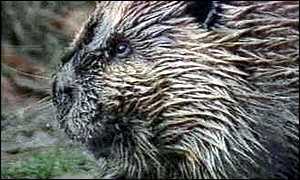
Beaver to return to wild
By Susanna Reid in BBC News 20 th January 2001
 It is simply a myth that beavers create huge, unwieldy dams across rivers
It is simply a myth that beavers create huge, unwieldy dams across rivers
Conservationists are planning trials to re-introduce the beaver back into Britain 400 years after it disappeared.
The animal was hunted for its fur, its meat and a scent gland which was said to cure headaches. Now two separate projects could see the animal return to its native home in England and Scotland.
In East Anglia, conservationists are waiting to get the go-ahead to place beavers in a 40-hectare (100-acre) enclosure in the Fens later this year.
"They are such enchanting creatures, and it's a disgrace that they were hounded out of existence" said Derek Gow, from the Wild Wood Centre in Kent, which is taking part in the project.
'Water gardeners'
"They are water gardeners, which makes them vital for creating wetlands.
"It is simply a myth that beavers create huge, unwieldy dams across rivers, and they're vegetarian, so they don't damage fish stocks."
Scottish Natural Heritage is also planning trials around the Knapdale Forest in Argyll, but it must first get the support of local people and the Scottish Executive.
"It would be a seven-year trial of beavers imported from Norway," said Nancy Fraser from Scottish Natural Heritage.
"The animals would be flown over and quarantined. We would then tag them with radio transmitters and release them."
She added that if the trial involving three families of beavers is successful, there were plans to introduce the creatures all over Scotland.
Local opposition
However, the proposals have met with resistance from local farmers and landowners, who are anxious about the effect beavers could have on drainage systems and salmon stocks.
"The trials just don't address these concerns," said Robin Malcolm, who owns a 2,000-hectare (5,000-acre) farm next to the Argyll trial site.
"There is a good reason why these creatures are extinct. They may damage farmland and bring disease. They could affect the local otter population which we treasure highly, and we don't want them back."
But Scottish Natural Heritage insists that any beavers on the trial site would be carefully monitored.
"If they wreak havoc, we'll simply go out and trap them," said Ms Fraser.
"They are slow, lumbering creatures - they'll be easy to catch up with. There's no danger that they'll run out of control."
© BBC News, 20 th January 2001
 |
 |
 |
| Return to index | Return to Exotic Scottish Animals | Return to European Beaver |